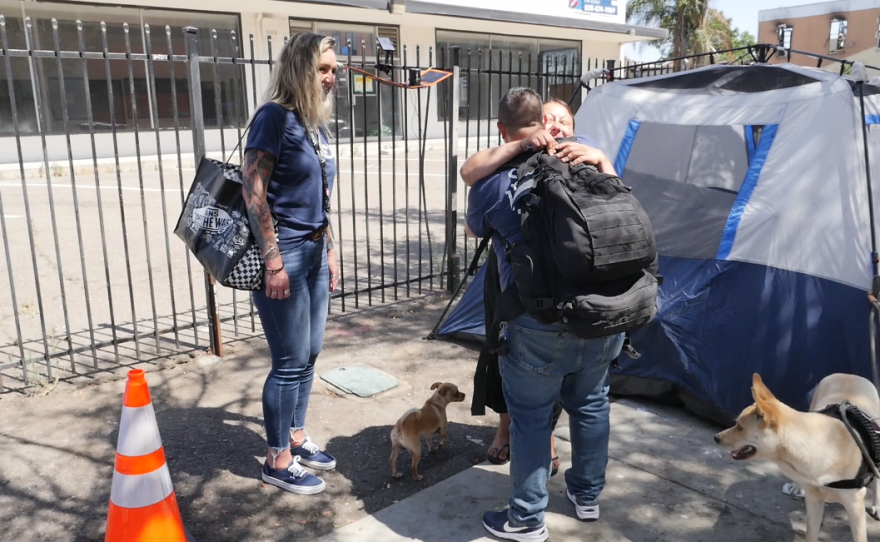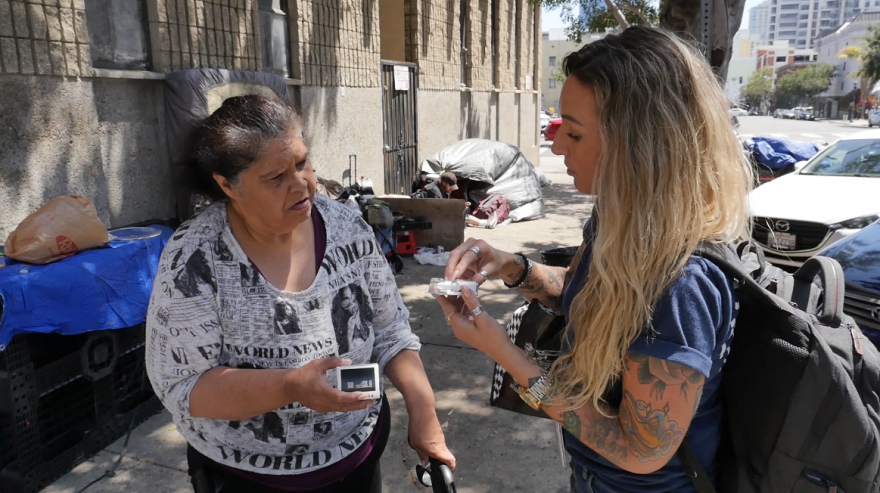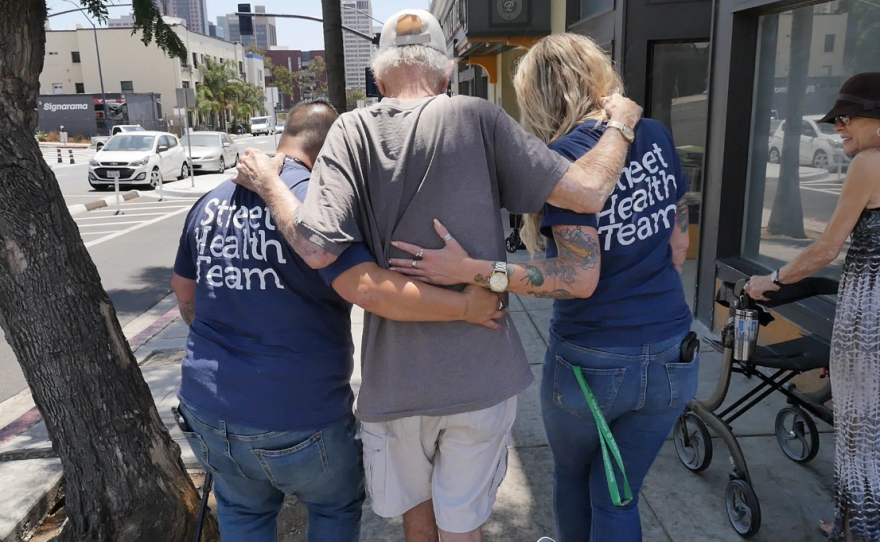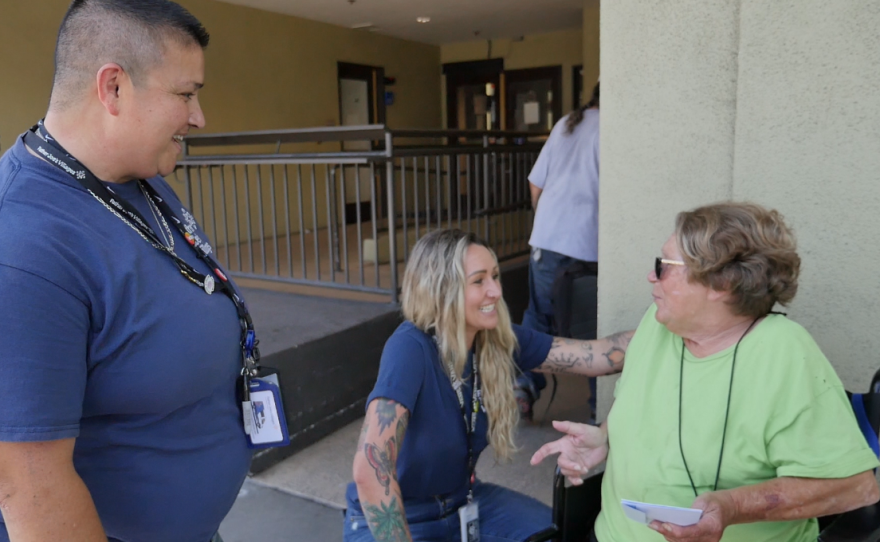On a recent afternoon in downtown San Diego, the Father Joe’s Villages Street Health Team got ready to head out in their van — nicknamed “Florence Nightingale” — to check in with their clients experiencing homelessness.
Monday through Friday, twice a day, a combination of three outreach workers, two nurse practitioners, a doctor, a psychiatrist and a supervisor go out into the streets of downtown San Diego.
On this particular day, KPBS joined supervisor Jennifer Wilkens and outreach worker Michelle LeFever to see their homeless outreach work first hand.
The team is constantly working on building relationships with the homeless community by showing up and following through, with the goal of getting their clients into shelter.

“When they tell Michelle, ‘Hey, I’m considering getting into shelter, can you tell me what that looks like? What are my options?’ That’s success,” Wilkens said. “When we start having those meaningful conversations about what they can do to start making some progress, that’s success.”
You wouldn't know it when you meet them, but both Wilkins and LeFever overcame addiction themselves. Also formerly homeless, LeFever describes her work as a way of "living amends" for her past.

“I understand my clients. I’ve been where they’ve been. I understand what it means to — that need to hide the pain — use substances as a solution. I get all that, but now, also what I get is I get that there is life after that, if you work hard for it and I think that’s what makes me bond with my clients,” LeFever said.
According to the San Diego District Attorney’s office, homeless San Diegans are 118 times more likely than the general population to die of a drug overdose. County medical examiner data show 214 unsheltered residents have died from overdoses so far in 2023, most were from fentanyl.
Each member of the team carries a backpack. One has medical supplies as well as Narcan and other medications to reverse overdoses that they give to clients.
“You can do a sternum rub to see if they have any signs of life and if not you can take out the second dose and then do another dose in the nostril," Wilkens said, showing a client how to use Narcan. "But make sure that you are calling for emergency services or asking someone to help you."

"Ok, thank you,” the woman said.
Another backpack carries more basic necessities, which the team calls tools of engagement.
“When walking up to people they look at us and they're just like, 'Don’t bother me,' right? But I mean, how does that look if I walk up carrying a water and a snack. So sometimes this could mean whether or not they stick their head outside the tent,” LeFever said.
Those tools and connections go a long way. They can eventually lead clients to reveal personal information that makes it easier for the team to follow up and track their progress.
“So that we can get people registered and into the system so that we can document on them later,” Wilkens said.
One of the team's current clients is Steven Brown, who said he has been living on the streets for the last six months. Brown greeted Wilkens and LeFever with a hug. He said he's grateful for their help treating a wound from a bike accident that became infected.
“Without them I couldn’t be walking right now. My leg was really infected. It was bad and it was hurt," Brown said. "They looked at it and said, ‘Hey, we have a solution for you.’ And they gave me medication and everything I needed. I couldn’t have done it without ‘em. I didn’t know what to do without ‘em.”
“We see people physically heal. We see people's health get better because they started taking their medications. We see people start practicing safer use practices and so their use is causing less harm,” Wilkens said.
Father Joe’s psychiatrist Dr. Safi Ahmed said many unsheltered residents have anxiety, depression and likely experienced trauma. He credits the street health team’s ability to break down barriers.
“They're the hero for building those connections," Ahmed said. "That's probably the biggest issue, trust and building that rapport. I mean some of these people have been really hurt and abused their whole lives and trust is hard to build and so the outreach team does that. Once that's built, that's when I come in.”
In the last year, the team has helped move about 20 people into permanent housing and almost 60 into shelters, LeFever said. But that's only a very small number of people compared to the need. In July the Downtown San Diego Partnership counted 1,556 people living unsheltered downtown.

Adding to the challenge, LeFever said since the city started enforcing its "Unsafe Camping Ordinance," which prohibits camping on public streets when shelter beds are available and at any time within two blocks of schools, parks and other sensitive areas, simply finding people has become more difficult.
“This was supposed to be a solution to help, not to hinder and when clients are actually willing to receive that help and that’s not the first thing that is being offered, it’s heart wrenching," LeFever said. "For us as a street health team, it’s hard to find our clients. It’s been hard to find our patients.”
In response, a San Diego spokesperson said the ordinance is meant "to communicate that our sidewalks are not an acceptable place to live and to encourage unhoused people to work with their case managers to get on a path to ending their homelessness. We’re seeing success on that front.”
Every day is different for the street health team, but one thing is always consistent: They make an impact in the lives of San Diegans experiencing homelessness. And sometimes that impact builds trust and leads to success stories like Ruthie Lavinia Wilson’s.
“She was always so inebriated, I couldn’t help her get her documents to get permanent supportive housing. It took me over a year to get her birth certificate,” LeFever said.

Wilson described a life filled with traumatic experiences. She said she had been living on the street in San Diego for the last three years.
“I was raped at 15. I had a baby and my parents put me out and I’ve been abused and I was left out in the desert for dead. My ex-husband, he pulled both my arms out of their sockets and I decided to become homeless so he couldn’t find me,” Wilson said. “One thing led to another, I ended up sleeping outside of Ralph’s on the street. These guys came in and swooped me up and they came every week to make sure they found me and take care of my wounds.”
Wilson describes being afraid to sleep because letting her guard down would have made her vulnerable to being attacked.
“You don’t want to get beat up. You don’t want to get raped. You don’t want to get robbed cause it’s all a possibility," she said.
A report from the San Diego County District Attorney’s office says people who are homeless in San Diego are 12 times more likely to be assaulted than the general population.
But recently Wilson moved into her own apartment. With her receipt for paying her first month’s rent in hand, she credits LeFever for never giving up on her.
“She made it a point that I didn’t fall through the cracks,” Wilson said.
“We don’t give up on people no matter what," LeFever said. "We have clients, like I said, somedays they’re willing to work with us and they’re willing to accept our help and then they aren’t, but no matter what, we don’t give up on them. We keep coming back, even when they don’t want us to.”
Getting people into housing is the ultimate success for the street health team, but LeFever counts all the milestones.
“They want to have the conversation of, ‘Hey I want to get clean and sober. Can you help me?’ And we’ve helped people and I’ve delivered people to detox, to rehab and I’ve watched them successfully finish and successfully move on with their lives.”






